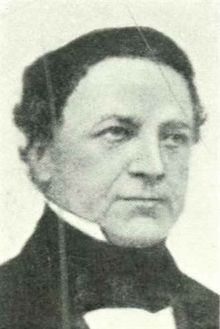Hans Mathias Velschow
Hans Mathias Velschow (born November 22, 1796 in Copenhagen ; † July 8, 1862 ) was a Danish historian.
Life
He was the son of the brewer and master carpenter Christian Velschow and his wife Catharine Marie Krollerup.
In 1815 he left the metropolitan school with distinction. Three years later he received the university gold medal for his treatise on the Danish coat of arms, its creation and changes. In 1822 he passed the theological exam. In 1824 he received the gold medal of the scientific society for his treatise as part of a prize assignment Om Myntens udvortes Tilstand i Danmark fra Knud den stores Tider indtil den Oldenborgske tribe Regering (About the shape of coins in Denmark from Knud the Great to the government of the Oldenburg). In 1832 he received his master's degree and went abroad for two years. In 1833 he became a professor of history and Nordic antiquities at the University of Copenhagen . In 1836 he became a member of the Kongelige danske Selskab for Fædrelandets Historie og Sprog . In 1841 he became a member of the Videnskabernes Selskab (now the Royal Danish Academy of Sciences ), 1841-1850 he was chairman of the board of directors of the Danske historiske Forening . In 1850 the funding of the chair changed and he became "Professor Rostgardianus".
The number of his publications is not great, but he threw a new light on the sources. The little Latin essay Om Biskop Regner (About Bishop Regner) is an early example of the application of modern source criticism in Denmark. His treatise Om Bryderne (On the unfree overseers) His dissertation on the army in the time of King Valdemar Sejr ( Commentationis de institutis militaribus Danorum, regnante Valdemaro secundo, pars prior , 1839) opened up completely new insights into social conditions in ancient times. He also came to new knowledge in his treatise Om Folkemængden i Danmark i Midten af det 13. Aarhundrede (1841) (About the population in Denmark in the middle of the 13th century.) The edition of the Danish history of the begun by Peter Erasmus Müller He continued Saxo Grammaticus . The first part with the text appeared in 1839, the second part with the explanations in 1858.
The long periods of time were due to his listlessness from which he suffered. He had great problems finally finishing his work. He also lacked imagination and liveliness, which was evident in his lectures and writings. His thoroughness was expressed in dry texts. The writer Frederik Paludan-Müller criticized him for the fact that his astute conclusions were often lost in subtleties.
He also wrote important treatises on the Schleswig question , in the Antislesvig-Holstenske Fragmenter (booklet 9): Udsigt over de Begivenheder, Forhandlinger og Overenskomster, who have bestemt Hertugdømmet Slesvigs statsretlige Forhold til Danmark og Holsten siden 1459 (overview of the events, negotiations and conventions that have determined the constitutional relationship between Schleswig and Denmark and Holstein since 1459.) and Bemærkninger anaaende det slesvigske Ridderskabs Oprindelse (remarks on the emergence of the Schleswig knighthood) and Om Øen Femerns statsretlige Forhold (on the constitutional situation on the island of Fehmarn ). He was a member of the commission that was supposed to determine the border between Schleswig and Holstein as a result of the peace provisions of 1850 . There he did a lot for the Danish cause, so that the damage to Denmark was limited. In February 1853 he was elected to the Folketing and so came to the Reichstag. There he supported the government in the conflict over the Succession Act. After the dissolution of the Reichstag in April 1853, he was not re-elected.
literature
- Johannes Steenstrup: Velschow, Hans Mathias . In: Carl Frederik Bricka (Ed.): Dansk biografisk Lexikon. Tillige omfattende Norge for Tidsrummet 1537-1814. 1st edition. tape 18 : Ubbe – Wimpffen . Gyldendalske Boghandels Forlag, Copenhagen 1904, p. 378-380 (Danish, runeberg.org ).
Remarks
- ↑ "Professor Rostgardianus" was a special title for professors at the Chair of Nordic History and Antiquities at the University of Copenhagen. The name is derived from the fact that it was financed from the Frederik Rostgaards foundation.
- ↑ "Bryte" is literally the one who cuts and hands out the food. Like the Latin word "villicus", it denotes the unfree or freed person who supervised the other unfree persons of the court. Source: Reallexikon der Germanischen Altertumskunde , Volume 4, p. 26.
- ↑ When it was certain that King Friedrich VII would remain childless, Princess Louise of Hessen-Kassel-Rumpenheim was the next candidate for the throne according to the then applicable right of succession from 1660 . She transferred this right to her husband, Prince Christian, who later became King Christian IX. The alternative was for a king from the Swedish house of Bernadotte to ascend the throne, which was important to the representatives of Scandinavianism . This possibility was excluded in the London Protocol of 1852. Now a new right of succession to the throne should be created for the whole of Denmark with purely male succession, so that the succession for Denmark is not regulated differently than that for Schleswig and Holstein. The different succession regulations were part of the German-Danish conflict over Schleswig.
| personal data | |
|---|---|
| SURNAME | Velschow, Hans Mathias |
| BRIEF DESCRIPTION | Danish historian and politician, member of the Folketing |
| DATE OF BIRTH | November 22, 1796 |
| PLACE OF BIRTH | Copenhagen |
| DATE OF DEATH | July 8, 1862 |
